Breast Revision Surgery
Find the Cause, Evaluate the Condition
Find the Cause, Evaluate the Condition
Depending on your current condition, differences can occur in several areas in revision surgery.
Accurate understanding of reasons for revision surgery (such as capsular contracture,
dissatisfaction with size or symmetricity of implant, and damaged implant) is required to
plan for most effective surgery to give best results.
Duration
About 2 hr
Anesthesia
General Anesthesia
Hospitalization
About 1 day
Clinic visit
2~3 times

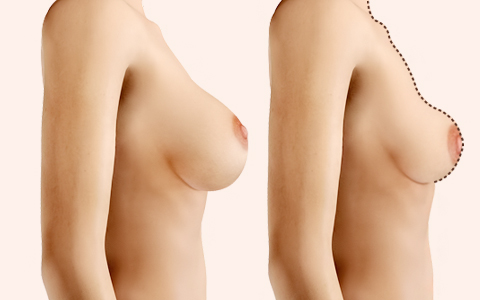
Dissatisfaction With Shape
Double Wrinkles
Formation of wrinkles underneath the breast where the implant is located
Deformity
Protrusion of upper part of the breast due to incorrect positioning
of the implant. Depending on the situation, some correction
may be possible in early days after the surgery.
If many days have passed after the surgery, existing implant needs to
be detached before repositioning or reinserting into the proper position.
Dissatisfaction With Size
The size of the implant should be carefully chosen based
on your height, physique, and condition of your thorax.
However, reoperation may be required if the post-operative
size is not satisfactory.
This is one of the least difficult revision surgeries where
incision is made on the original site and implant is replaced
with more suitable size.
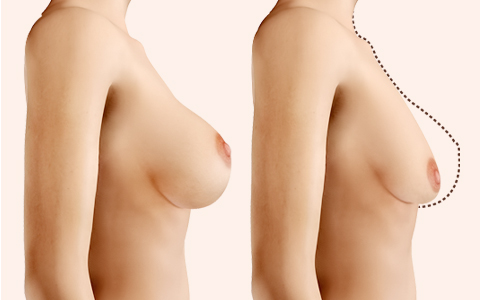
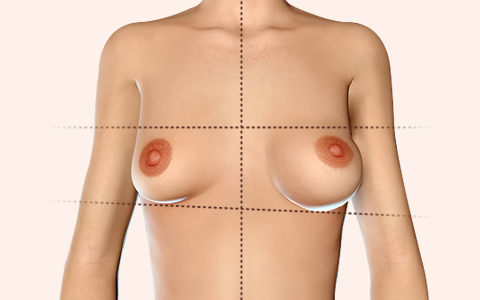
Asymmetric Breast
After thorough examination, replace the existing implant with more
suitable size and position it appropriately to create desired shape.
Damaged Implant
Compared to latest implant types, implants used in the past
have a high rate of rupturing and cause alteration in the
shape due to fluid leakage.
If the old implant is made of saline, leakage does not cause
issues as it will be absorbed into the body but in the case of
silicone it must be cleaned and extracted. Reoperation is
performed by removing the bio-film and inserting a new implant.
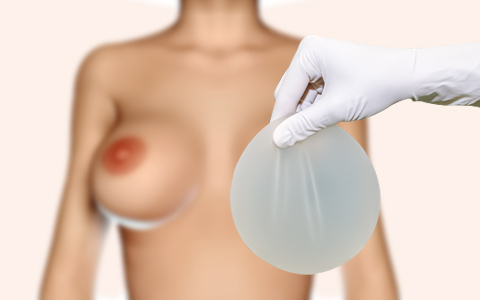
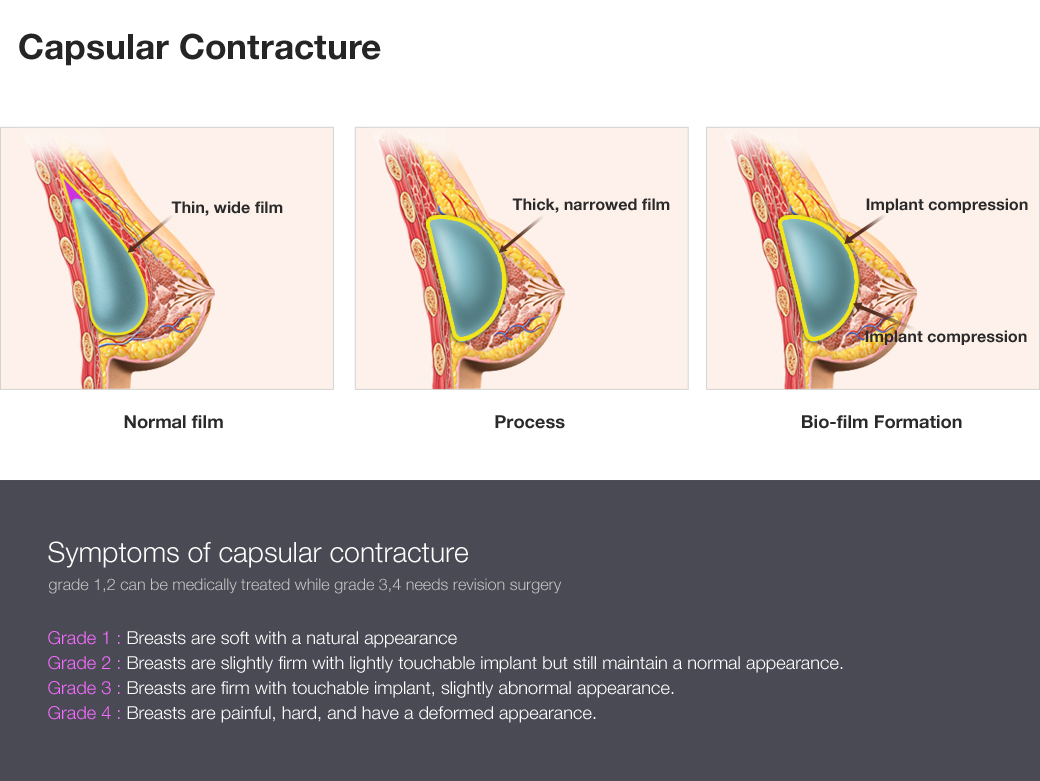
A.
The subfacial breast augmentation is the most recent breast reconstruction method developed by Dr. Ruth Graf,
the head of the Brazilian Breast Surgery, in 2004. It is the latest method of breast surgery that
utilizes both the advantages of submammary implantation and intramusclar implantation.
It basically inserts the implant above the breast muscles and between the fascia, tissue that stabilizes
and separate surrounding muscles, and muscular fat tissue.
It requires highly skillful surgeons to perform the delicate and
complex fascia separation compared to conventional methods used in other hospitals.
Conventional intramuscular implantation has a shorter operation time compared to subfascial implantation but,
while there may be some variance between hospitals,
there are cases where the separation is performed with a simple blunt (dull) dissection.
A.
It is patient friendly technique. In the case of the usual intramuscular insertion method,
resection the lower part of the breast muscle was inevitably for muscle separation. Not only that,
for 1 to 2 weeks after surgery, sternum (rib) under the breast muscles will be inflamed,
accompanied by pain due to surgical hemorrhaging and damaging from surgical instruments which are the two most common causes of severe pain
This results in a long recovery period and discomfort.
Subfascial implantation does not require a surgical procedure that causes these two pains,
resulting in only a mild discomfort similar to muscle aches after straining exercise and a short recovery period.
Furthermore, overall breast shape is very natural and
good surgical results are obtained even for moderate to severely sagging breast
For those who have very poor or thin breast tissues, we use the intramuscular implantation method (double plane method).
However, we do not recommend intramuscular implantation for those who are suitable for subfascial implantation
A.
Assuming that the surgery went well without any complications, no inflammation/hemorrhage/tissue damage,
body reacts to the inserted implant by surrounding it with bio-film (a kind of scar tissue).
Typical silicone or smoothed implants causes bio-film to form fibrous tissues (hard and tough).
And the thicker the fibrous tissue are, harder and more rigid the breast becomes.
Amount of fibrous film formation determines the texture of the breast implant.
Microthane implants made up of polyurethane coating prevents fibrous film formation around the
implant compared to silicone or smoothed implants.
This completely different kind of film formation is witnessed via the result of a very soft breast.
A.
In general, breast augmentation by intramuscular implantation may cause complications such as the rotation
of the water drop implants due to the movement of the muscles and shifting of the implant position to up, down,
or lower side due to the contraction of the muscle.
This can result in unnatural breast shape and hence they recommend patients to
limit the muscle movement until the implant is fully anchored.
In contrast, subfascial implantation is not affected by the muscles movement during the exercise,
so you can move your arms freely after the surgery.
A.
Our body feels pain thru sensory nerves. Post-operative pain is caused by inflamed tissues during
it’s healing process in the first week of the surgery
Generally the intensity of pain tends to be greater when it comes from the internal organs and
pain from inflammation is least severe. In the case of breast surgery by intramusclar implantation,
inflammation of the sternum (rib) underneath the muscle is inevitable and the resulting pain may be similar to a rib fracture.
Our subfascial implantation does not cause inflammation of the sternum,
resulting in only a mild discomfort similar to muscle aches after exercising.
A.
After the breast surgery, most common cause for unnatural or deformed shape is due to capsular contracture or
rotation and shifting of the implant. Also, it is possible that appropriate shape and
size of the implant was not selected for the individual. Conversely, if you do not have any of these side effects,
you can have a natural looking breast.
A.
All three implants are silicone-based, and the tissue reaction is similar when inserted into our body.
Overall shape and texture of the breast after surgery depends on the
formation of a fibrous tissue around the silicone textured implant.
For silicone-textured implants, the rate of occurrence of capsular contracture is similar and
occurrence rate of grade 2 or higher is usually about 15-20%. In addition,
research papers show that re-operation due to cosmetic reasons varies from
35 to 40% within 10 years after surgery with some variance.
A.
The microthane breast implant is completely different from the conventional silicone-based breast implant,
resulting in a significantly lower rate of capsular contracture. According to the survey,
although there are slight differences, only 1-3% is reported to have suffered from capsular contracture.
From October, 2017 to January, 2019, we conducted a survey on 150 patients who underwent microthane subfascial breast augmentation.
We found more than 90% of patients were very satisfied with the outcome in terms of breast shape and size.
There was no case of grade 2 or higher capsular contracture occurrence or deformity due to implant rotation.
Among the 150 patients, 65 patients who used different types of implant had
reoperation due occurrence of capsular contracture, implant rupture, or shifted position from their first.
These 65 patients had re-operation using microthane implant in various sizes ranging from 240 to 390cc, with average being 310cc.
 Breast
Breast
Urszula's Real Story Micothane tear drop implant
 Breast
Breast
Bronwyn's Real Story Princess Breast Augmentation
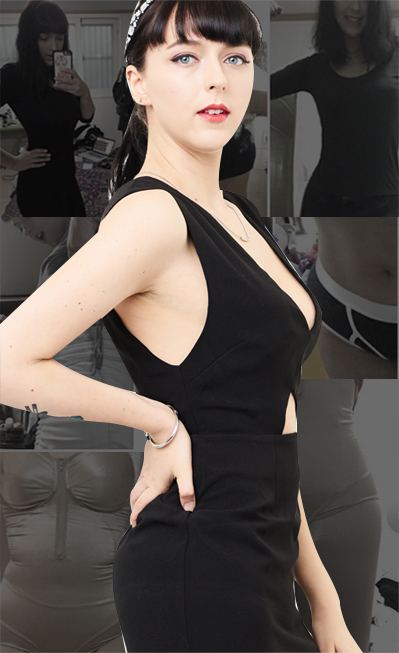 Liposuction
Liposuction
Marian's Real Story Pull Body Liposuction